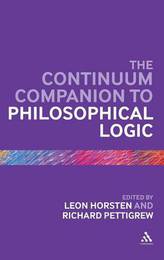
|
The Continuum Companion to Philosophical Logic
Hardback
Main Details
| Title |
The Continuum Companion to Philosophical Logic
|
| Authors and Contributors |
Edited by Professor Leon Horsten
|
|
Edited by Dr Richard Pettigrew
|
| Series | Bloomsbury Companions |
|---|
| Physical Properties |
| Format:Hardback | | Pages:656 | | Dimensions(mm): Height 234,Width 156 |
|
| Category/Genre | Philosophy - logic |
|---|
| ISBN/Barcode |
9781441154231
|
| Classifications | Dewey:128.33 |
|---|
| Audience | | Professional & Vocational | |
|---|
|
Publishing Details |
| Publisher |
Continuum Publishing Corporation
|
| Imprint |
Continuum Publishing Corporation
|
| Publication Date |
4 August 2011 |
| Publication Country |
United States
|
Description
The Continuum Companion to Philosophical Logic offers the definitive guide to a key area of contemporary philosophy. The book covers all the fundamental areas of philosophical logic - topics that have continued to attract interest historically as well as topics that have emerged more recently as active areas of research. Seventeen specially commissioned essays from an international team of experts reveal where important work continues to be done in the area and, most valuably, the exciting new directions the field is taking. The Companion explores issues pertaining to classical logic and its rivals, extensional and intensional extensions of classical logic, semantics for parts of natural language, and the application of logic in the theory of rationality. Crucially the emphasis is on the role that logic plays in understanding philosophical problems. Featuring a series of indispensable research tools, including an A to Z of key terms and concepts, a detailed list of resources, a bibliography and a companion website, this is the essential reference tool for anyone working in contemporary philosophical logic.
Author Biography
Leon Horsten is Professor of Philosophy at the University of Bristol, UK. Richard Pettigrew is a Lecturer in Philosophy at the University of Bristol, UK.
ReviewsThe Continuum Companion to Philosophical Logic provides a broad range of topics to choose from with the papers varying as to how demanding they are technically. Additionally, the editors furnished not only a guide at the beginning of the book, but also a very helpful list of further readings. These features suggest that this volume will be a useful source of readings and references to professional philosophers and students alike. -- Notre Dame Philosophical Reviews
|